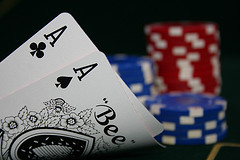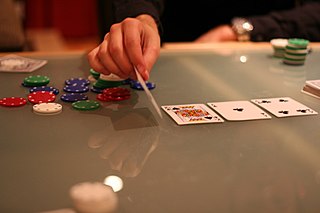A poker player is drawing if they have a hand that is incomplete and needs further cards to become valuable. The hand itself is called a draw or drawing hand. For example, in seven-card stud, if four of a player's first five cards are all spades, but the hand is otherwise weak, they are drawing to a flush. In contrast, a made hand already has value and does not necessarily need to draw to win. A made starting hand with no help can lose to an inferior starting hand with a favorable draw. If an opponent has a made hand that will beat the player's draw, then the player is drawing dead; even if they make their desired hand, they will lose. Not only draws benefit from additional cards; many made hands can be improved by catching an out — and may have to in order to win.
In a poker game with more than one betting round, an out is any unseen card that, if drawn, will improve a player's hand to one that is likely to win. Knowing the number of outs a player has is an important part of poker strategy. For example, in draw poker, a hand with four diamonds has nine outs to make a flush: there are 13 diamonds in the deck, and four of them have been seen. If a player has two small pairs, and he believes that it will be necessary for him to make a full house to win, then he has four outs: the two remaining cards of each rank that he holds.
In poker, pot odds are the ratio of the current size of the pot to the cost of a contemplated call. Pot odds are compared to the odds of winning a hand with a future card in order to estimate the call's expected value. The purpose of this is to statistically guide a player's decision between the options of call or fold. Raising is an alternative to place this decision on the opponent.

Omaha hold 'em is a community card poker game similar to Texas hold 'em, where each player is dealt four cards and must make their best hand using exactly two of them, plus exactly three of the five community cards. The exact origin of the game is unknown, but casino executive Robert Turner first brought Omaha into a casino setting when he introduced the game to Bill Boyd, who offered it as a game at the Las Vegas Golden Nugget Casino. Omaha uses a 52-card French deck. Omaha hold 'em 8-or-better is the "O" game featured in H.O.R.S.E.

Texas hold 'em is one of the most popular variants of the card game of poker. Two cards, known as hole cards, are dealt face down to each player, and then five community cards are dealt face up in three stages. The stages consist of a series of three cards, later an additional single card, and a final card. Each player seeks the best five card poker hand from any combination of the seven cards; the five community cards and their two hole cards. Players have betting options to check, call, raise, or fold. Rounds of betting take place before the flop is dealt and after each subsequent deal. The player who has the best hand and has not folded by the end of all betting rounds wins all of the money bet for the hand, known as the pot. In certain situations, a "split-pot" or "tie" can occur when two players have hands of equivalent value. This is also called a "chop-pot".
In poker, the probability of each type of 5-card hand can be computed by calculating the proportion of hands of that type among all possible hands.
Lowball or low poker is a variant of poker in which the normal ranking of hands is inverted. Several variations of lowball poker exist, differing in whether aces are treated as high cards or low cards, and whether straights and flushes are used.

Video poker is a casino game based on five-card draw poker. It is played on a computerized console similar in size to a slot machine.
The fundamental theorem of poker is a principle first articulated by David Sklansky that he believes expresses the essential nature of poker as a game of decision-making in the face of incomplete information.
Every time you play a hand differently from the way you would have played it if you could see all your opponents' cards, they gain; and every time you play your hand the same way you would have played it if you could see all their cards, they lose. Conversely, every time opponents play their hands differently from the way they would have if they could see all your cards, you gain; and every time they play their hands the same way they would have played if they could see all your cards, you lose.
Suited connectors is a poker term referring to pocket cards that are suited and consecutive, for example Q♥ J♥. These hands are considered stronger than average because they have the highest potential to form straights and flushes when combined with the community cards.
Non-standard poker hands are hands which are not recognized by official poker rules but are made by house rules. Non-standard hands usually appear in games using wild cards or bugs. Other terms for nonstandard hands are special hands or freak hands. Because the hands are defined by house rules, the composition and ranking of these hands is subject to variation. Any player participating in a game with non-standard hands should be sure to determine the exact rules of the game before play begins.

In Texas hold 'em, a starting hand consists of two hole cards, which belong solely to the player and remain hidden from the other players. Five community cards are also dealt into play. Betting begins before any of the community cards are exposed, and continues throughout the hand. The player's "playing hand", which will be compared against that of each competing player, is the best 5-card poker hand available from his two hole cards and the five community cards. Unless otherwise specified, here the term hand applies to the player's two hole cards, or starting hand.
Morton's theorem is a poker principle articulated by Andy Morton in a Usenet poker newsgroup. It states that in multi-way pots, a player's expectation may be maximized by an opponent making a correct decision.
In community card poker, a player or hand is said to be counterfeited when a community card does not change the value of their hand, but makes it more likely that an opponent will beat it. This occurs primarily in Omaha hold 'em Hi-Lo split and sometimes in Texas hold 'em. Counterfeiting also occurs in the Badugi variant of draw poker.

High Stakes Poker is an American cash game poker television program. The poker variant played on the show is no limit Texas hold 'em. The first four seasons ran from January 16, 2006 to December 17, 2007 on GSN. The next three seasons ran from March 1, 2009 to May 21, 2011, and was simulcast in 3DTV on N3D. The eighth season ran from December 16, 2020 to March 17, 2021 on PokerGO. The ninth season premiered on February 21, 2022.

Casino Hold'em is a casino gambling game. This banking game, introduced by Stephen Au-Yeung in 2000 and now played in live casinos worldwide. It was licensed for use in the United Kingdom in 2007. In addition online casinos offer the game, which is based on the traditional multi-player Texas Hold'em Poker.
The following is a glossary of poker terms used in the card game of poker. It supplements the glossary of card game terms. Besides the terms listed here, there are thousands of common and uncommon poker slang terms. This is not intended to be a formal dictionary; precise usage details and multiple closely related senses are omitted here in favor of concise treatment of the basics.
Poker is a popular card game that combines elements of chance and strategy. There are various styles of poker, all of which share an objective of presenting the least probable or highest-scoring hand. A poker hand is usually a configuration of five cards depending on the variant, either held entirely by a player or drawn partly from a number of shared, community cards. Players bet on their hands in a number of rounds as cards are drawn, employing various mathematical and intuitive strategies in an attempt to better opponents.

Community card poker refers to any game of poker that uses community cards, which are cards dealt face up in the center of the table and shared by all players. In these games, each player is dealt an incomplete hand face down, which are then combined with the community cards to make a complete hand. The set of community cards is called the "board", and may be dealt in a simple line or arranged in a special pattern. Rules of each game determine how they may be combined with each player's private hand. The most popular community card game today is Texas hold 'em, originating sometime in the 1920s.